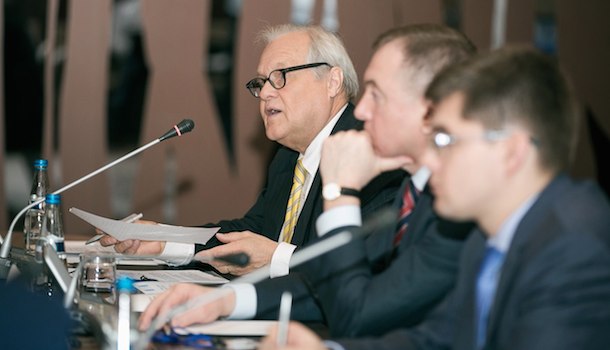More commonly known as the Minsk-II accords, the agreements became the legal and political basis for deescalating the conflict in eastern Ukraine and intensifying negotiations within the Trilateral Contact Group. From the beginning, the accords were perceived with varying degrees of optimism/pessimism by its stakeholders and the international community at large. Several times in 2015, they appeared on the brink of collapse in the face of growing political and military tension in the Donbas region.
The Minsk-II agreements did have a major accomplishment – they helped to minimise hostilities on the ground and, thus, saved human lives on both sides of the frontline. In spite of the fact that the implementation of the 13 points of the Package of Measures is largely lagging behind, a year later, the accords remain the only legitimate foundation for the resolution of the Ukraine crisis.
Commemorating the first anniversary of the Minsk-II accords, the Minsk Dialogue track-II initiative, in cooperation with the Konrad Adenauer Stiftung (Germany), hosts an international conference in Belarus in order to facilitate a frank and in-depth exchange about their achievements, future challenges and lessons learned. Like a year earlier, Minsk will gather representatives of the Normandy quartet to discuss conflict resolution in Ukraine’s east, this time at expert level.
Track-II Diplomacy Format
The conference will be held under the Chatham House Rule in order to facilitate frank and open exchange. Government representatives will be invited as observers.
Participants
Leading experts from the Normandy group – Ukraine, Russia, Germany and France – and other European countries. Belarusian experts will perform the role of moderators and facilitators.
Conference Objectives
- Track record: to analyse the Minsk-II accords’ accomplishments and failures to date.
- Challenges: to map short- and longer-term challenges to the accords’ further implementation.
- Moving forward: to produce concrete policy recommendations to all stakeholders.
- Looking beyond Minsk-II: to start a discussion about the future of security in eastern Europe.
Expected Outcomes (Minsk Dialogue non-paper)
- A review of the latest developments in eastern Ukraine and within the Normandy quartet and the Trilateral Contact Group.
- International perspectives on the accomplishments and shortcomings of the Minsk-II accords.
- An account of major short- and longer-term challenges to the accords’ further implementation and to the security of eastern Europe at large.
Programme
Thursday, 11 February
|
9.00-9.30 |
Registration |
|
9.30
9.30-10.00 |
Conference begins Welcoming remarks (Open to the press) Uladzimir Makey – Minister of Foreign Affairs of the Republic of Belarus Martin Sajdik – Special Representative of the OSCE Chairperson-in-Office in Ukraine and in the Trilateral Contact Group Yauheni Preiherman – Head, Minsk Dialogue Track-II Initiative |
|
10.00-12.00 |
Session 1. Minsk-II Accords: what have been the achievements and failures to date? (Open to the press) |
|
|
Vladimir Fesenko – Chairman of Board, PENTA Centre, Ukraine Aleksandr Gushchin – Associate Professor, Russian State University for the Humanities; Expert, Russian International Affairs Council, Russia Wolfgang Sender – Country Director Belarus, Konrad Adenauer Foundation, Germany Anastasiya Shapochkina – Researcher, Sciences Po; Lecturer, Sorbonne University, France Chair Andrei Rusakovich – Chairman of the Board, Foreign Policy and Security Research Centre, Belarus |
|
12.00-12.30 |
Coffee break |
|
12.30-14.30 |
Session 2. Minsk-II Accords: lessons learned and challenges ahead Hans-Jochen Schmidt – Ambassador (Rtd), Germany Ihor Smeshko – Advisor to the President, Ukraine Sergey Utkin – Head, Department of Strategic Assessment, Centre for Situation Analysis, Russian Academy of Sciences, Russia Daria Khaspekova – Web Editor-in-Chief, Russian International Affairs Council, Russia Chair Aliaksandr Filipau – Dean, Belarusian State University of Culture and Arts; Expert, Discussion and Analytical Society Liberal Club, Belarus |
|
14.30-15.30 |
Lunch |
|
15.30-17.30 |
Session 3. Minsk Agreements’ impact on eastern Europe: in search of sustainable regional stability Andrei Skryba – Researcher, Centre for Comprehensive European and International Studies, Higher School of Economics, Russia Oleksiy Poltorakov – Director’s Advisor, National Institute for Strategic Studies under the President of Ukraine, Ukraine Barbara Kunz – Research Fellow, French Institute of International Relations, France Dzianis Melyantsou – Senior Analyst, Belarusian Institute for Strategic Studies, Belarus Chair Yauheni Preiherman – Head, Minsk Dialogue Track-II Initiative, Belarus Conference adjourns |


